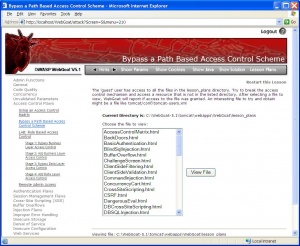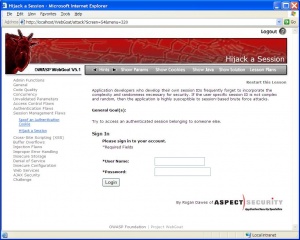This site is the archived OWASP Foundation Wiki and is no longer accepting Account Requests.
To view the new OWASP Foundation website, please visit https://owasp.org
Difference between revisions of "Category:OWASP WebGoat Project"
(→Download) |
(→Download) |
||
| Line 14: | Line 14: | ||
Check out the project [[OWASP WebGoat Project Roadmap|roadmap]] and find some tasks that you can help with right away. | Check out the project [[OWASP WebGoat Project Roadmap|roadmap]] and find some tasks that you can help with right away. | ||
| − | |||
| − | |||
| − | |||
| − | |||
| − | |||
| − | |||
== Overview == | == Overview == | ||
Revision as of 18:08, 18 January 2008
WebGoat is a deliberately insecure J2EE web application maintained by OWASP designed to teach web application security lessons. In each lesson, users must demonstrate their understanding of a security issue by exploiting a real vulnerability in the WebGoat application. For example, in one of the lessons the user must use SQL injection to steal fake credit card numbers. The application is a realistic teaching environment, providing users with hints and code to further explain the lesson.
Why the name "WebGoat"? Developers should not feel bad about not knowing security. Even the best programmers make security errors. What they need is a scapegoat, right? Just blame it on the 'Goat!
To get started, read the WebGoat User and Install Guide
Goals
Web application security is difficult to learn and practice. Not many people have full blown web applications like online book stores or online banks that can be used to scan for vulnerabilities. In addition, security professionals frequently need to test tools against a platform known to be vulnerable to ensure that they perform as advertised. All of this needs to happen in a safe and legal environment. Even if your intentions are good, we believe you should never attempt to find vulnerabilities without permission.
The primary goal of the WebGoat project is simple: create a de-facto interactive teaching environment for web application security. In the future, the project team hopes to extend WebGoat into becoming a security benchmarking platform and a Java-based Web site Honeypot.
Check out the project roadmap and find some tasks that you can help with right away.
Overview
WebGoat is written in Java and therefore installs on any platform with a Java virtual machine. There are installation programs for Linux, OS X Tiger and Windows. Once deployed, the user can go through the lessons and track their progress with the scorecard. There are currently over 30 lessons, including those dealing with the following issues:
|
|
For more details, please see the WebGoat User and Install Guide.
Releases
WebGoat 5.1 Standard:
The standard release is a download, unzip, and click-to-run release. It comes with the Java Runtime Environment and a configured Tomcat 5.5 server.
* Double-click on webgoat.bat - a Tomcat command window starts * Browse to http://localhost/WebGoat/attack
WebGoat 5.1 Developer (Waiting for Google disk quota approval issue 649):
The developer release includes the standard release with the addition of a configured eclipse environment. The developer release is also a download, unzip, and click-to-run release. It works exactly the same as the standard release if you only wish to explore the lessons. However, if you want to perform the labs or use WebGoat in the classroom, use the eclipse.bat to start up a preconfigured WebGoat environment. Detailed instructions are include at the top of the _HOW TO create the WebGoat workspace.txt_ file.
* Extract the Eclipse-Workspace.zip file to the working directory * Double-click the eclipse.bat file * In the Eclipse package explorer (top right), right click the WebGoat project and refresh * In the Eclipse package explorer (top right), right click the Servers project and refresh * In the Eclipse servers view (bottom), right click LocalHost server and start * Browse to http://localhost/WebGoat/attack * Any changes made to the source will automatically compile and redeploy when saved
Please send all comments to Bruce Mayhew at webgoat AT owasp.org regarding this release.
Future Development
WebGoat 5.1 - Is now available via svn at google code
WebGoat 5.2 - Estimated release date: Spring 2008
If you would like to become a member of the WebGoat source code project hosted at Google Code contact Bruce Mayhew at webgoat AT owasp.org.
New Features in 5.1
- Thanks to the OWASP Spring of Code project, Erwin Geirhart has provided a complete solutions guide that is avaliable via a new "show solution" button
- New database lessons
- XSS phishing lesson is available via the source code project at Google. Using a standard search feature, your mission is to create a "login" form on the page, steal the user credentials, and post the credentials to the WebGoat Catcher servlet.
- Catcher servlet. Want to prove your attack works? You can now write lessons where the attack can send sensitive information to the Catcher servlet. The Catcher servlet will write the posted values into the originating lesson's properties file.
- Documentation. A draft version of how to solve the WebGoat Labs is available at WebGoat Google Code Downloads
Project Contributors
The WebGoat project is run by Bruce Mayhew. He can be contacted at webgoat AT owasp.org. WebGoat distributions are currently maintained on [SourceForge]. The WebGoat framework makes it extremely easy to add additional lessons. We are actively seeking developers to add new lessons as new web technologies emerge. If you are interested in volunteering for the project, or have a comment, question, or suggestion, please join the WebGoat [mailing list].
Project Sponsors
The WebGoat project is sponsored by

Pages in category "OWASP WebGoat Project"
The following 17 pages are in this category, out of 17 total.


